by Aliou Sall
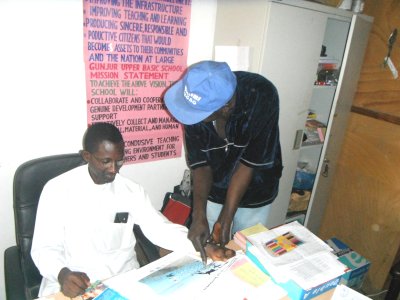
The pilot activities of the FAO - EAF Nansen Project were completed in July 2012. However, the teachers of the participating schools, encouraged by the school inspectors, already set up a plan of action to pursue the original purpose of introducing the ecosystem approach to fisheries in the school teaching programme.
They want to continue to critically use and possibly develop further the teaching aids and the quality and pertinence of teaching. In tune with its own vision, Mundus maris continues to collaborate with them towards consolidating the early results.
This fits well into the national efforts to improve teaching conditions and the relevance of the content taught to prepare all children for active lives as citizens and fully functioning members of society.
After the summer break 2012, the new term had started with a lower level of activities as no additional means were available at this point in time from within the ordinary resource allocation through the regional Department of Education. A Mundus maris mission in October 2012 served to maintain contact and provide at least some equipment and modest operational funding to enable interested schools to plan some further excursions and other activities which they had found useful during the FAO pilots. The mission delivered two laptop computers for Serrekunda and Tanji, three digital cameras for teachers in Tanji and Gunjur and the equivalent of 100 Euros in Dalasi for each of the five schools to support the teachers and improve their working conditions.
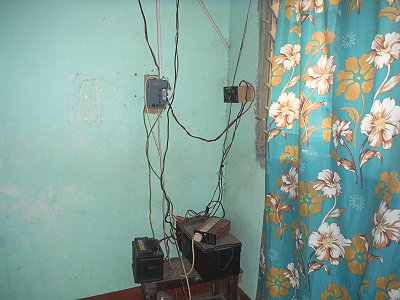
The delivery of this support was done in the presence of two school inspectors and much appreciated. Significant additional needs require attention to put the schools on equal footing.
Serrekunda and Tanji have access to the electricity grid though the electric installations are prone to failure as can be seen from the photos.
Gunjur still requires stand alone solutions as it is not connected to mains. The solar panel is still working, e.g. for recharging cell phones. It would have to be replaced by a more powerful installation, when possible given the still high prices of solar panels. Immediate replacement of the old the battery at the end of its useful life would already go quite some way to stablise electricity supply in the schools in Gunjur. The cost is around 6,600 Dalasi (140 Euro) for a new battery.

The conversations started during the October mission were continued in a more structured manner in the occasion of a review workshop with the teachers and the inspectors that took place during the weekend of 15-16 December 2012 at the Serrekunda Lower Basic School.
The government's commitment to drive up the quality of teaching at school means an interest in providing easy access to additional resources for teachers and pupils, through better training for teachers and also through the internet and other means requiring electricity.
The work with the schools and the school inspectors also puts into evidence a more general commitment to involve citizens in practical activities aiming to put their lives on a more sustainable footing.
Specific measures for the economical use of water and for keeping the environment clean through civic action are part and parcel of this strategy. This merits more general recognition and emulation as the benefits are immediate in social, economic and environmental terms.
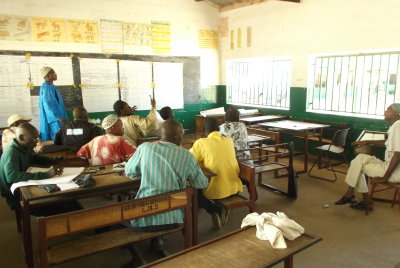 As part of the joint reflection on how best to carry forward the work that has started with the FAO pilots and continues through the action plan of the teachers a workshop with the teachers and school inspectors was convened by Mundus maris in the premises of Serrekunda Lower Basic School, which had already been an active participant in the pilots thanks to the commitment of the head teacher, Bolong Touray. With the heavy workload of the teachers, only the weekend of 15 and 16 December 2012 was available for the get together.
As part of the joint reflection on how best to carry forward the work that has started with the FAO pilots and continues through the action plan of the teachers a workshop with the teachers and school inspectors was convened by Mundus maris in the premises of Serrekunda Lower Basic School, which had already been an active participant in the pilots thanks to the commitment of the head teacher, Bolong Touray. With the heavy workload of the teachers, only the weekend of 15 and 16 December 2012 was available for the get together.
During the opening session Mr. Mbenga, the school inspector, who had already followed the FAO pilots very pro-actively, provided a contextualisation of the continued testing activities. He recalled the on-going reform process of the national curriculum. He informed about the consultation and support activities involving public bodies and national and international public organisations and NGOs that help take the goverment commitment torward ensuring universal access to education.
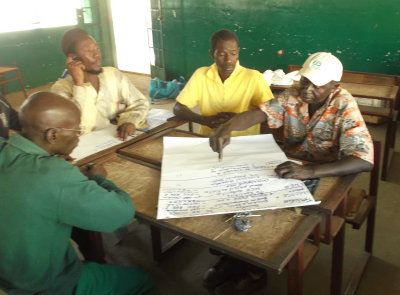 The Gambian Ministry of Basic and Secondary Education has the lead. It is present through regional education directorates in all six regions of the country and has various structures through which to coordinate external cooperation with its own policy and planning all the way from development to implementation.
The Gambian Ministry of Basic and Secondary Education has the lead. It is present through regional education directorates in all six regions of the country and has various structures through which to coordinate external cooperation with its own policy and planning all the way from development to implementation.
Mr. Mbenga insisted strongly on the need to connect the encouraging activities so far to this wider institutional process to facilitate sharing the experience and preparing the ground for wider uptake.
The work then continued in an alternation of group work and plenary. Work during the first day focused a lot on reviewing achievements and difficulties so far, notably also what upgrades in terms of resources would allow the schools to capitalise more on the efforts made so far.
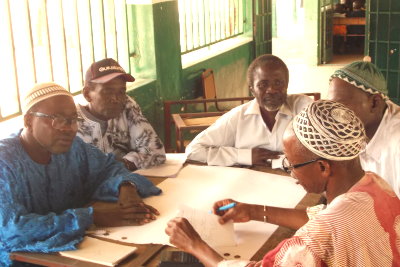 Unsurprisingly, some down-to-earth measures and supplies were in the forefront of the teachers' minds. They pointed to the need for equipment, such as computers and electricity supply for the schools deprived so far, among others.
Unsurprisingly, some down-to-earth measures and supplies were in the forefront of the teachers' minds. They pointed to the need for equipment, such as computers and electricity supply for the schools deprived so far, among others.
They also noted that other schools had expressed interest in participating in an extension of the comprehensive approach of teaching the economic, social and environmental dimensions of how the fisheries are interacting with marine ecosystems. These schools have so far been unable to access the teaching kit and operational budgets required as minimum conditions.
The teachers' discussions were rich and focused on identifying the gaps in the way of translating the principles of national policy into tangible effects at the level of the school's ground realities.
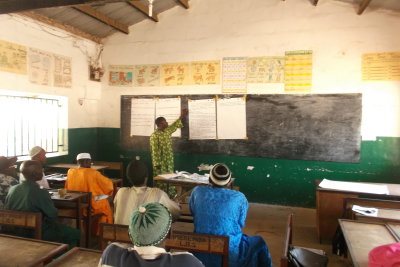
The second day focused more specifically on the way forward: One proposal focused on setting up a resource centre in the Serrekunda Lower Basic School with its 4000 pupils. Such a resource centre could serve as a learning ground first of all for the big school in Serrekunda itself, but also for others, particularly with the continued flanking measures of the inspectors and better institutionalisation of the project activities.
The teachers also explored ways to reach out to the other interested schools, but believe that would be easier with stronger institutionalisation of their current project-based activities.
Mr. Mbenga offered to support this effort for better institutional grounding and recommended some meetings between Mundus maris representatives and the relevant authorities and partners as well as seizing every possible opportunity to continue mobilising additional resources to the local and national efforts.
The workshop concluded with a good sense of what has been achieved and with a clear identification of what should be priorities for next year. As from now, we encourage donations to the following Mundus maris account at the Dexia Bank, IBAN: BE54 0688 9178 6297 - BIC/SWIFT: GKCCBEBB with the mention "Support to schools in The Gambia".









